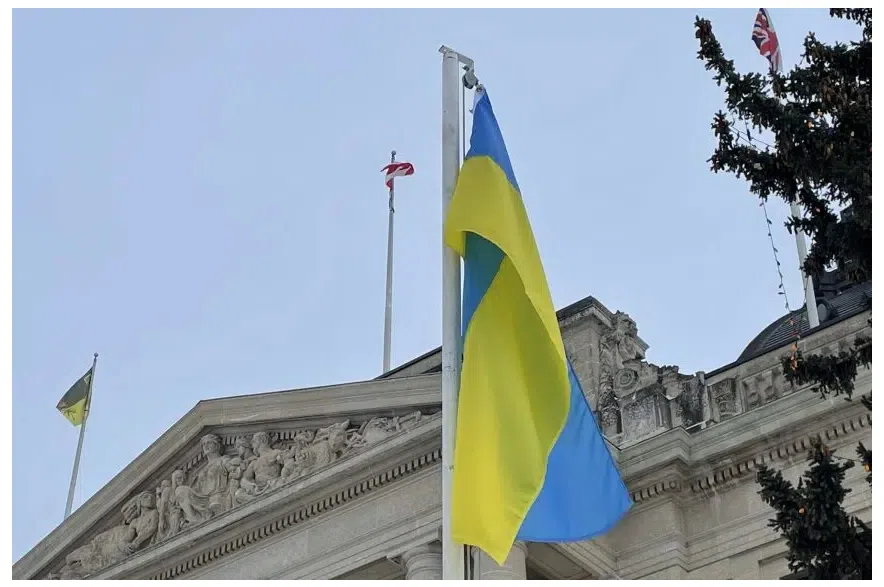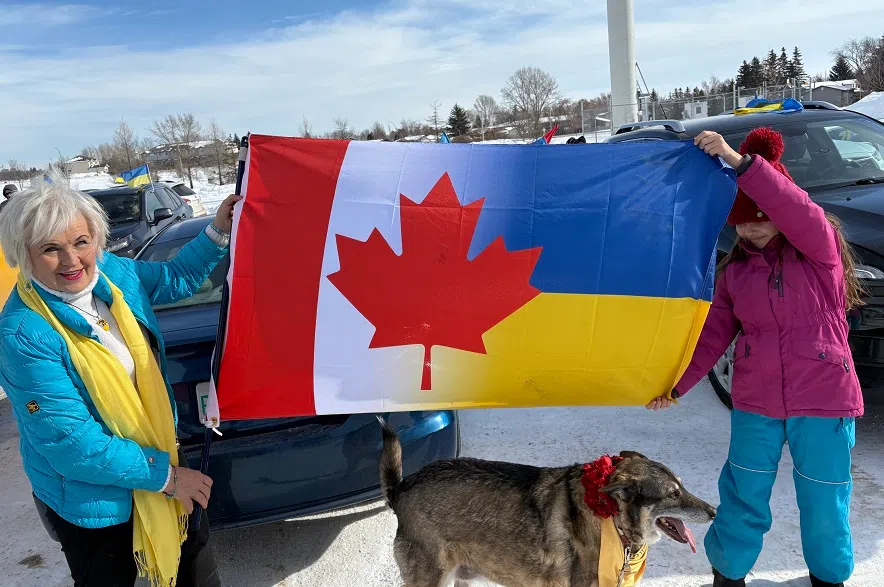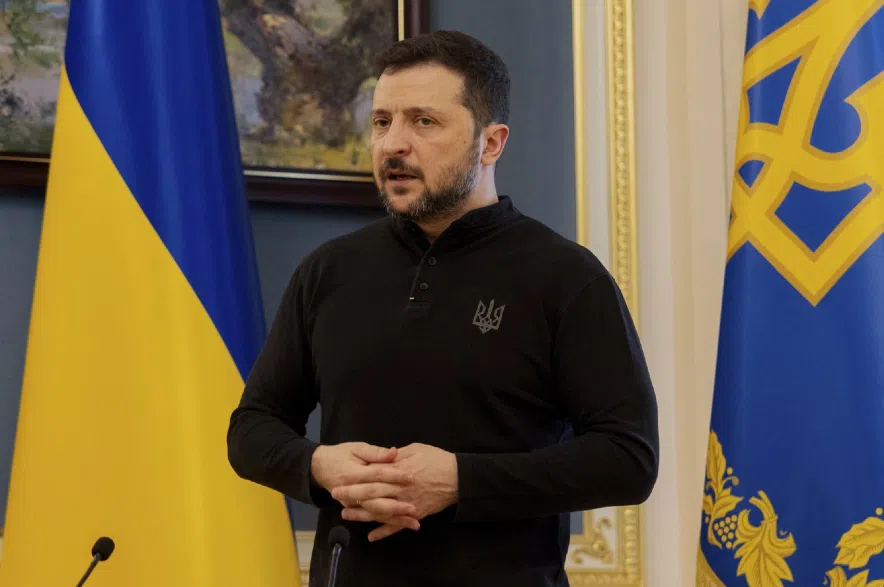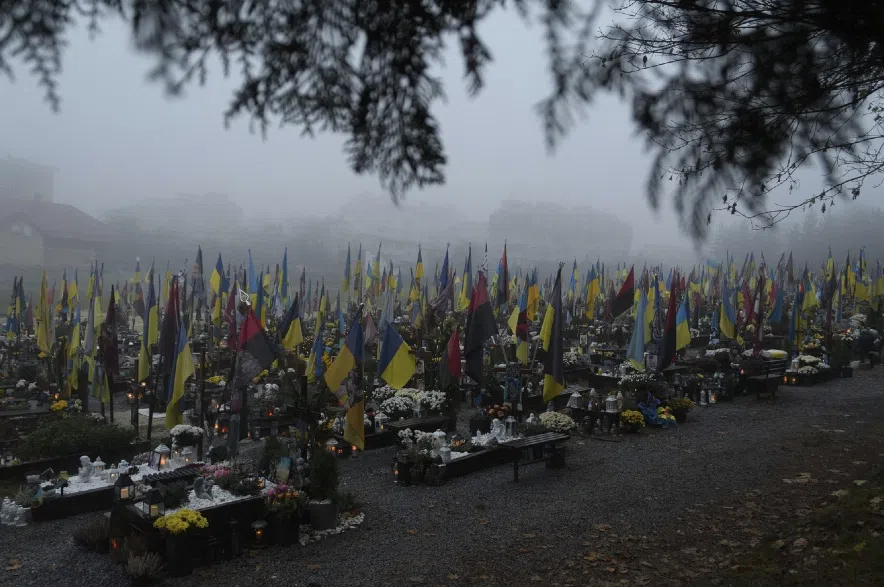Rallies were held across Canada this weekend, including in several Saskatchewan cities, marking the three-year anniversary of the Russian invasion of Ukraine.
Russia’s army crossed the border on Feb. 24, 2022, in an all-out invasion that Russian President Vladimir Putin claimed was needed to protect Russian-speaking civilians in eastern Ukraine and prevent the country from joining NATO.
The invasion is the largest and deadliest conflict in Europe since the Second World War, and has caused hundreds of thousands of military casualties and tens of thousands of Ukrainian civilian casualties.
Read more:
- Ukrainian bilingual school close to doubling in size with more newcomers making Sask. home
- ‘I like it here:’ Saskatchewan town steps up for Ukrainian refugees
Recently, Prime Minister Justin Trudeau reaffirmed Canada’s support for Ukrainian President Volodymyr Zelenskyy in the midst of increasing political tensions between his country and the United States.
Trudeau repeated his call for Ukraine to be at the negotiating table as U.S. President Donald Trump’s officials met with their Russian counterparts to discuss a possible deal to end the war, leaving out Ukraine.

The flag of Ukraine flown at the Saskatchewan Legislative Building. Over 9000 Ukrainians had come to Saskatchewan over the past three years. (Sarah Mills/980 CJME)
Danoylo Puderak, Executive Director of the Ukrainian Canadian Congress of Saskatchewan (UCC Saskatchewan), told 650 CKOM’s Lara Fomninoff in an interview on Friday that he was not expecting to be marking a third anniversary of the conflict in Ukraine.
“It’s been a very stressful time, for not only people here, but certainly for the millions of people in Ukraine that either have had to flee their their homes, or are now looking at their cities destroyed and occupied by the Russian oppressors.”
About 300,000 Ukrainians have come to Canada on emergency visas since 2022 and Puderak said over 9000 Ukrainians had come to Saskatchewan over the past three years.
“It’s three years of this full-scale invasion but really it goes beyond that,” Puderak said.
“This is something that Vladimir Putin has said that they’ve been planning for a while. Three years is a long time … and things fall off people’s radar screens, but people are still dying every single day — bombs falling on people’s homes, on hospitals, on schools.
“One of my staff, her sister’s fiance was killed on the front lines two-and-a-half weeks ago. This is a young fellow, 23 years old, looking forward to his life, getting married and having a family. The sad thing about that is that it’s not a rarity, that story is all too common. It affects people so profoundly. ”

Judy Anne holding up a Canadian and Ukrainian mixed flag at the Saskatoon car rally on Feb. 22, 2025. (Will Mandzuk/650CKOM)
Many events planned to mark sombre anniversary
In Saskatoon on Saturday, UCC Saskatchewan’s Saskatoon branch held a car rally that wound its way through city streets in a visible demonstration of ongoing support for Ukraine’s fight for sovereignty and freedom.
Garland Mochoruk is a third generation Ukrainian Canadian who attended the Saskatoon rally. He said the amount of heartbreak and bad news is exhausting.
“I’m getting tired … we cry at night when we watch the news,” he said. “It’s heartbreaking and it goes on and on and there doesn’t seem to be an end to it. The world shouldn’t tolerate genocide. We have a war criminal that wanders about the world freely.”
Serhiy Savchenko was also at the Saskatoon rally. He said he has family members that are still in Ukraine and is able to speak with them regularly, but said it’s heartbreaking.
“Seeing people die, our soldiers die, it’s not okay,” he said.
Other events in Saskatoon to mark the sombre anniversary this weekend included a Destroyed Temples of Ukraine exhibition on Sunday at Musée Ukraina Museum, offering visitors a look at the destruction of Ukraine’s sacred architecture and cultural heritage, presented in partnership with Kyiv’s Maidan Museum.
On Monday, the Prairie Centre for the Study of Ukrainian Heritage and the U of S Ukrainian Students’ Association will host a vigil at St. Thomas More College Chapel at 12:30 p.m., and the Ukrainian Museum of Canada will hold a come-and-go gathering from 10 a.m. to 4 p.m., where visitors are invited to see an exhibition titled The War That Changes Everything, while enjoying tea, refreshments and community fellowship.
The Regina branch of UCC Saskatchewan also held a car rally on Sunday, starting at 2 p.m., where cars were asked to display banners with messages like “Crimea is Ukraine”, “Sanction Russia” and “Ukraine wants Peace”.
In Prince Albert, about 80 people attended a vigil on Saturday at St. George’s Ukrainian Catholic Church, hosted by the local Veselka Ukrainian Culture and Heritage Club.
The club said the event served as a moment of reflection, remembrance, and solidarity with Ukraine and the Ukrainian Canadian community.
There’s also a fundraising supper for Ukraine, planned for Feb. 28 in Prince Albert at St. George’s Ukrainian Catholic Church Hall, with proceeds will help provide equipment for the Ukranian forces.
On Monday, the Holy Trinity Ukrainian Orthodox Church in the town of Canora, which has a rich Ukrainian heritage in Saskatchewan, will hold a service at 10 a.m. marking the anniversary

Ukraine’s President Volodymyr Zelenskyy gives a press conference in Kyiv, Wednesday, Feb. 19, 2025. (THE CANADIAN PRESS/Pool Photo via AP-Tetiana Dzhafarova)
Support expressed for Zelenskyy
UCC Saskatchewan’s Puderak said he thought Ukrainian President Volodymyr Zelenskyy was the right person for the right time to lead Ukraine.
“Ukraine is extremely fortunate to have such a strong president and he communicates well. He tells the story like it is, he doesn’t let us forget and, more importantly, he doesn’t let our allies forget exactly what’s going on.
“Russia has a history of being an imperial empire, and that even though it was for many years called the Soviet Union, it was still about Russia and power and influence. They don’t like the fact that they don’t have as much of that as they did before.
“Ukraine is so important to that Russian myth — it’s about Western values, democracy, freedom, freedom of speech versus the authoritarian,” Puderak said.
“In Russia, they don’t have free elections. Ukraine does, and it’s this battle between these two very different ways of viewing their people.”
Puderak also said the rhetoric coming from U.S. President Donald Trump is not based in fact.
“I don’t know what his game is. You don’t treat your allies this way.”
‘So grateful for what Saskatchewan has offered’
The Ukrainian Canadian Congress was founded in 1940 during the Second World War to help displaced Ukrainians come to Canada, and Puderak said the organization in Saskatchewan is doing the same in 2025.
“We’ve been strengthened by the the people that have come to this province … In addition to settlement services, we’re helping connect displaced Ukrainians to valuable jobs so they’re independent financially,” he said.
“We offer language classes and the great thing is that it’s not just Ukrainians in those classes, there’s people from all over, so we’re helping build a bridge and integrate them into into our province’s society, and we’re seeing many of them becoming volunteers.
“They say it’s about giving back. They’re so grateful for what Saskatchewan has offered them.”
Puderak said Saskatchewan wasn’t high on the radar of displaced Ukrainians at first but now that they’ve been in Canada for a while, they realize that cities like Toronto and Montreals are expensive places to live.
“We talk about the Saskatchewan advantage — people are coming here because they see that cost of living is more affordable than than in those big cities, and there’s job opportunities.”
Some struggles for settlers in Saskatchewan
Puderak said there have been some struggles for new Ukrainians getting settled.
“One of the challenges is language. Many of them come with little or no English. Some of them are single moms with kids, so they need a little bit of extra help. They’ll take what are called survival jobs — enough to pay the rent and buy groceries.
“They work hard to improve their language skills so that they can get into a better job, something maybe closer to what their their professional background was in Ukraine.”
He said older adults also faced challenges learning English.
“Languages aren’t the easiest thing to learn. Kids can pick it up easily and quickly become fluent.”
Puderak said funding for their English classes ends on March 31.
“Unless the federal government extends it, then there’s going to be a lot of people that are going to be in a position where they won’t have access to settlement services.”
He said many the Ukrainians who have settled in the province are applying for their permanent residency and face the added concern that the federal government has decreased the number of people that its targets for immigration to Canada.
“There are fewer seats available through provincial nominee programs. So that’s impacting the ability of the people that are here, legally, working, paying taxes, to be able to apply for and get their permanent residency.
“The process takes a while. They need a job. They need a work offer or a letter of employment from a an employer. Not all employers want to do that extra work for them.”
He said that instability of the federal government right now was also a concern, with the Liberal leadership change and a potential federal election.
“There’s some important decisions that need to happen before March 31 and who’s going to make those decisions?”
— with files from 650 CKOM’s Will Mandzuk, PANow’s Nigel Maxwell and Canadian Press
Read more:











